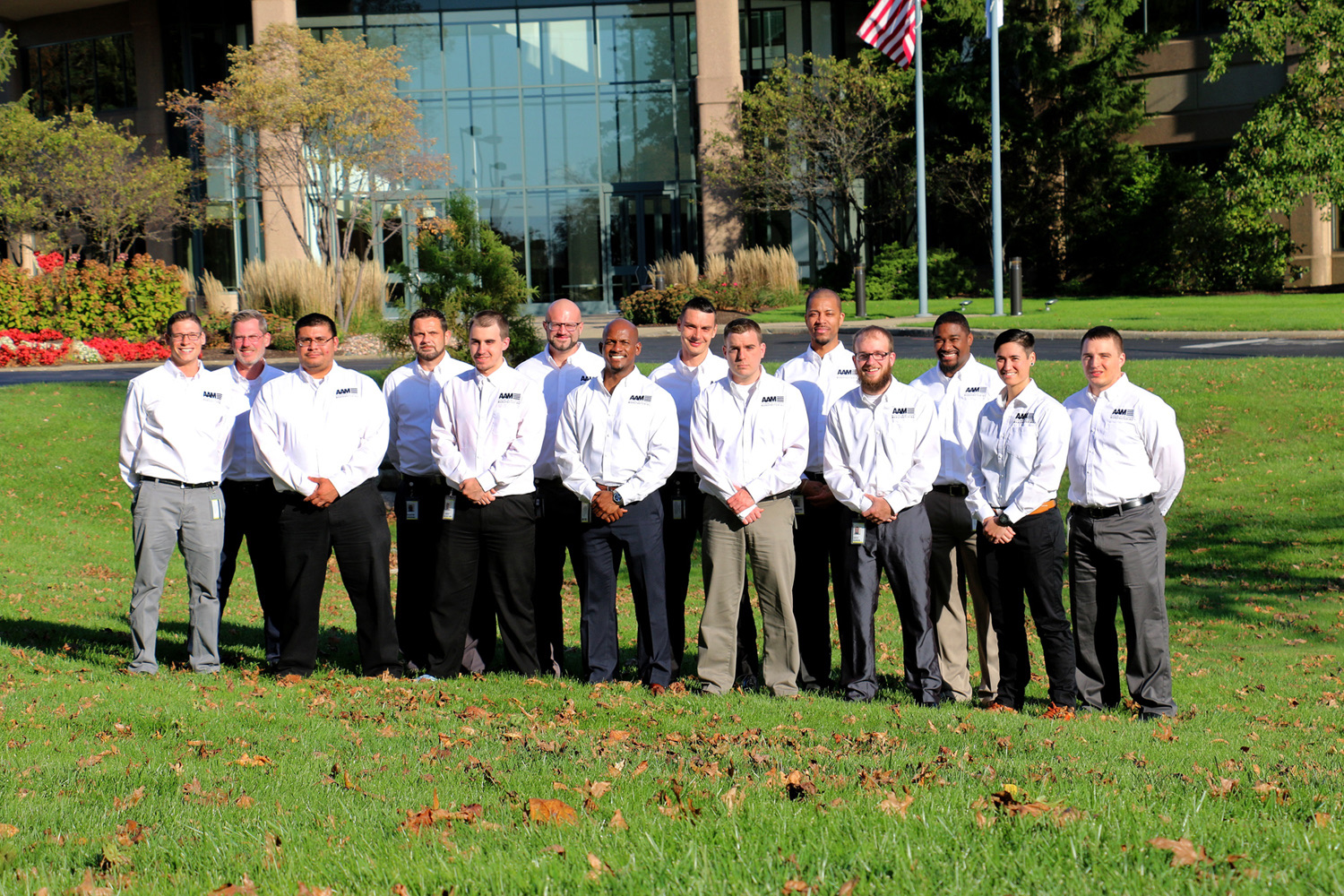
by Gary Mintchell | Nov 27, 2017 | Workforce
Rockwell has had a strong training program for many years. I took my first week-long class in 1991 or 1992. Altogether I have taken about six classes—controls, PLCs, drives, motor control centers, software. I know how intense the training can be.
Last week I posted a podcast of thoughts from Rockwell Automation’s annual series of events held the week prior to Thanksgiving. Now I’m in Spain at yet another conference and trying to get caught up on posts before I start a flurry of posts from here.
So first—training, diversity, and education.
When the company showed off some graduates of its new Academy of Advanced Manufacturing and they talked about the intensity of the three month program, memories came back.

Veterans
ManpowerGroup and Rockwell Automation celebrated the first military veterans to graduate from the Academy of Advanced Manufacturing and secure high-paying jobs in the rapidly-evolving manufacturing industry.
The 12-week program launched in August combines classroom learning with hands-on laboratory experience. Veterans are trained in Rockwell Automation’s state-of-the art facility in Mayfield Heights, Ohio for in-demand jobs in advanced manufacturing. All of the graduates have job offers and more than half have multiple job offers that significantly increase — some graduates even doubling — their previous salaries.
“This program felt like it was made just for me,” says Travis Tolbert, U.S. Navy veteran and academy graduate. “It focused on controls and automation, which is something I’ve always wanted to do, but was never able to do until now. The academy helped me take my military skills and understand how I could make them relevant for jobs outside of the Navy.”
“In recognition of Veterans Day, on behalf of Rockwell and ManpowerGroup, we thank all our veterans for their service,” said Blake Moret, CEO of Rockwell Automation. “We are honored to recognize our first military veterans to graduate the Academy of Advanced Manufacturing. We’ve seen their unique combination of core work and tech-savvy skills evolve to successfully position them for careers in the industry. We’re confident this program will help solve a challenge critical to the growth of advanced manufacturing.”
If the accomplishments and future prospects of these veterans didn’t bring a tear or two, you had to have no feelings.
Women
Rockwell Automation has been announced as a 2017 Catalyst Award winner. The Catalyst Award honors innovative organizational approaches that address the recruitment, development and advancement of women and have led to proven, measurable results.
“We are thrilled to receive this recognition from Catalyst for our Culture of Inclusion journey, demonstrating our commitment to our employees, customers and community,” said Moret. “Our people are the foundation of our company’s success, and so we must create an environment where employees can and want to do their best work every day.”
The Culture of Inclusion journey began in 2007 with senior leaders renewing their commitment to diversity, inclusion and engagement. This was in response to employee data showing that women and people of color at the company had lower retention rates than white men, and there were gaps in the levels of representation for key demographics. A driving force of this strategy is the knowledge that in order to effect sustainable change, the dominant group—in this case, white men—must be aware of the impact of their privilege, be engaged, and partner with women and underrepresented groups in a meaningful way.
Results: Between 2008 and 2016, women’s representation in the U.S. increased from 11.9% to 23.5% among vice presidents, from 14.7% to 23.2% among directors, and from 19.3% to 24.3% at the middle-manager level. At the most senior leadership levels, women’s representation doubled, increasing from 11.1% to 25.0% among the CEO’s direct reports and from 11.1% to 20.0% on the board of directors. In addition, the Rockwell Automation voluntary turnover is well below the benchmark average for women.
Youth
On the Automation Fair show floor, Jay Flores, Rockwell Automation global STEM ambassador, led me on a tour of the FIRST Robotics area and explained how Rockwell is continuing its commitment to the program.
It announced a $12M, four-year commitment to FIRST—For Inspiration and Recognition of Science and Technology—founded to inspire young people’s interest and participation in science and technology.
Over the past 10 years, Rockwell Automation has provided more than $15M of broad-based support to address the critical need to fill science, technology, engineering and math (STEM) jobs that drive innovation. Many of these jobs go unfilled because of both the lack of awareness of the kinds of high-tech jobs available and the lack of skills to qualify for today’s needs.
“Through our technology and people, we are helping to inspire the next generation of innovators to fill the talent pipeline for our customers and for our company,” said Moret. “Our strategic partnership with FIRST helps us increase our reach and visibility to STEM students around the world.”
In addition to being a global sponsor of the FIRST LEGO League program and sole sponsor of the FIRST Robotics Competition (FRC) Rockwell Automation Innovation in Control Award, nearly 200 Rockwell Automation employees around the world donate their time for the FIRST programs, and more than 300 employees volunteer for the organization in other capacities. The company also donates products integral to FIRST program games and scoring. These product donations are specifically used for the FIRST Robotics Competition playing fields and scoring systems, and they are included within the parts kits teams use to build their robots.
“This generous, multiyear commitment from Rockwell Automation will allow us to focus on the strategic aspects of our partnership while continuing to help scale our programs and expose students to a broader range of industry-leading products and applications,” said Donald E. Bossi, president, FIRST. “The company has a long, rich history of supporting FIRST.”

by Gary Mintchell | Sep 5, 2017 | Education, News, Workforce
How much should we worry about the next generation manufacturing workforce? An email came through late last week from an organization that I’d heard of but never had any dealings with—Junior Achievement. Press release was titled, “Labor Day Blues: Three-in-Four Parents and Teens Concerned Global Competition and Automation will Make it Difficult for Next Generation to Have a Successful Job/Career”.
A new survey from Junior Achievement USA (JA) shows that 77 percent of parents are “concerned” about their children’s ability to have a successful job or career as adults in light of global competition and automation. The same percentage (77%) of teens said they share similar concerns about having a successful job or career in the future because of global competition and automation. The survey of 1,204 parents of school-aged students and 1,000 teens was conducted by ORC International for JA.
So I thought, this is interesting, but is it new? My parents were worried about my future employability when I graduated from high school a long, long time ago. I probably had some concern about my kids, but I’m generally more optimistic and have higher expectations, I guess, than others. (They are both doing well.)
Just wondered if they had run this survey every year for the past 50 would there be any trend? Or, are they just rushing to capitalize on the current state of media who relishes negative news?
Then I thought about some (not all) parents I run into through my soccer work. I’ve met the “helicopter parent”. They have kids who referee soccer, too. I’d imagine parents with that mindset would be concerned—probably for the rest of their lives.
On the other hand, I wouldn’t let my optimism get in the way of preparation. The JA CEO is on the right track here.
“Education and skills are going to be critical for the next generation’s success in an ever-changing workplace,” said Jack Kosakowski, CEO of Junior Achievement USA. “Many of the entry-level jobs we know today won’t be around in the next decade, and many of the jobs of tomorrow haven’t even been conceived of yet. It’s important we encourage our young people to explore post-secondary education, whether that be a university, community college, or a technical or trade school. Having some level of technical training is going to be critical for future career success. A high school diploma or GED just won’t be enough for many jobs.”
The Future Workforce Survey
In the survey, nearly half (45%) of parents said that they were “extremely or very” concerned about their children’s prospects for future employment, while almost as many teens (40%) had the same level of concern.
The survey was conducted in conjunction with the fall rollout of Junior Achievement’s work- and career-readiness programs. For more detail on these and other JA programs, visit JA’s programs page.
Methodology
This report presents the findings of ORC International’s Online and Youth CARAVAN surveys conducted among a sample of 1,204 parents of school-aged children and 1,000 13-17 year- olds. These surveys were conducted live from June 29 to July 6, 2017, for the parents’ portion and from July 11 to July 16, 2017, for the teens’ portion.
Respondents for this survey are selected from among those who have volunteered to participate in online surveys and polls. Because the sample is based on those who initially self-selected for participation, no estimates of sampling error can be calculated. All sample surveys and polls may be subject to multiple sources of error, including, but not limited to sampling error, coverage error, error associated with nonresponse, error associated with question-wording and response options.
About JA
Junior Achievement is the world’s largest organization dedicated to giving young people the knowledge and skills they need to own their economic success, plan for their future, and make smart academic and economic choices. JA programs are delivered by corporate and community volunteers, and provide relevant, hands-on experiences that give students from kindergarten through high school knowledge and skills in financial literacy, work readiness, and entrepreneurship. Today, JA reaches 4.8 million students per year in 109 markets across the United States, with an additional 5.6 million students served by operations in more than 100 countries worldwide.
–Gary Mintchell

by Gary Mintchell | Jan 17, 2017 | News, Organizations

MESA International has found a willing home for its annual North American conference once again aligning with the IndustryWeek Manufacturing & Technology (M&T) Conference & Expo. Both events will be held at the Huntington Convention Center in Cleveland, Ohio, USA, May 8 – 10, 2017. Registration for the global MESA community is now open.
I remember when one of the early leaders of the Smart Manufacturing Leadership Coalition was worried that it would lose its branding for Smart Manufacturing. Lately I’ve held conversations with marketing directors in the industry who use the SM term in a more or less generic way. So that leader was correct—Smart Manufacturing has become a phrase in alignment with other global phrases such as Industrie 4.0.
Saying that, the theme of the MESA North American Conference is “The Real Value of Smart Manufacturing” and will focus on highlighting the quantified business value realized by practitioners who have implemented “Smart” solutions. The MESA event will have one dedicated track of speakers and a pre-conference networking and problem-solving workout within the IndustryWeek M&T schedule-of-events. MESA will also have a booth in the M&T Expo, International and Americas Board-of-Directors meetings, committee and Working Group collaboration and networking opportunities for the global MESA community. Event information is available here.
Commenting on the event, Stephanie Mikelbrencis, Chair of MESA’s Americas Board, said, “The business leaders who read IndustryWeek want to know how to demystify Smart Manufacturing. I encourage them to join us in Cleveland to learn and to interact with others on the same journey to improved operations and business performance.”
The three-day IndustryWeek M&T Show brings together over 1,200+ senior manufacturers, 100+ exhibitors and 50+ conference sessions across eight tracks in manufacturing operations and design engineering. Conference content focuses on the key elements of advanced manufacturing: technology integration, leadership, operational excellence, design/engineering, talent development and supply chain.
Mike Yost, MESA President, added, “This is our 3rd year formally co-locating our NA Conference with IndustryWeek because it’s our opportunity to connect a company’s drive for continuous improvement to the IT-based solutions that can empower them. If your ‘Manufacturing-IT Strategy’ and the expected business value aren’t clear to everyone in your organization, you need to get your teams to this event.”
About MESA
MESA (Manufacturing Enterprise Solutions Association) International is a global, not-for-profit community of manufacturers, producers, industry leaders and solution providers who are focused on improving Operations Management capabilities through the effective application of Information Technologies, IT-based solutions and best practices. Goals:
- Enable members to connect, contribute, cultivate understanding, and exchange strategies to drive operations excellence.
- Collect, share, and publish best practices and guidance to drive greater productivity and the overall profitability of the manufacturing enterprise.
- Educate the marketplace on manufacturing operations best practices through the MESA Global Education Program.

by Gary Mintchell | Jan 5, 2017 | Commentary, News, Workforce
Manufacturing jobs are a hot topic. The concern was prominent in the presidential election. Journalists who know nothing about manufacturing or automation are pontificating. Everyone has ideas.
Seth Godin has written a perceptive article on jobs—where they were and where they are going. He is known as a marketing guru, but he is a keen observer of business.
In this post, he wrote about jobs going away. “The good jobs I’m talking about are the ones that our parents were used to. Steady, consistent factory work. The sort of middle class job you could build a life around. Jobs where you do what you’re told, an honest day’s work, and get rewarded for it. Those jobs. Where did they go? The computer ate them.”
Now, I argue that that is not all bad. Many of the jobs were mindlessly repetitive. Many were also physically debilitating or downright dangerous. But there is no denying that the economics of the 1950s and 1960s allowed companies to buy labor peace with high wages.
But things have changed.
“For a hundred years, industrialists have had a clearly stated goal: standardized workers building standardized parts. The assembly line was king, and the cruel logic of commodity economics pushed industrialists to improve productivity. They did this by improving the assembly line and, when they could, by paying workers less.”
Godin opines that today, workers serve the computer. From machine operators to office workers. “Sure, there are still pockets of work that are essentially unmeasured or unique enough that they’re difficult to replace. This is where the remaining ‘good jobs’ exist. For the rest, though, the first brick in the wall is clear: Either you serve the computer or it serves you. Either you are working on spec to create a commodity, or you are using new tools to create disruptions and to establish yourself as the linchpin, the one we can’t easily live without.”
Then Godin strikes at the schools. A topic that I’ve devoted time in thinking and acting on. “During the last forty years, as the computer and the network destroyed the system that our schools were built for, we (from the top down, and also, most definitely, from the bottom up) did almost nothing to change the schools we built.”
Whose fault is this? Well, that can be spread around. “Parents and the institutions they fund closed their eyes and only paid attention to SAT scores and famous colleges.”
Schools were developed to serve the new manufacturing economy. Emphasis on basic skills, sitting in rows, and following instructions replaced education. Godin—“When a pre-employed person says, ‘I don’t know how to code and I’m not interested in selling,’ we need to pause for a moment and think about what we built school for. When he continues, ‘I don’t really have anything interesting to say, and I’m not committed to making a particular change in the world, but I’m pretty good at following instructions,’ we’re on the edge of a seismic shift in our culture. And not a positive one.”
Reminds me of when my dad told me when I was around 14, “Study, go to college, learn to be an engineer. Don’t settle for a job on the assembly line where you sit there all day putting a bolt in a hole.”
Funny thing, though, that many of the guys I’ve known over the years who had rote jobs like that were quite creative outside the factory. If only we could have tapped and encouraged that creativity.
Godin concludes, “No, the good jobs aren’t coming back. But yes, there’s a whole host of a new kind of good job, one that feels fundamentally different from the old days. It doesn’t look like a job used to look, but it’s the chance of lifetime if we can shift gears fast enough.”

by Gary Mintchell | Dec 21, 2016 | Leadership, Workforce
Does anyone even know what a good Liberal Arts education is these days? To me, it meant that I could learn almost anything, express myself orally and verbally, appreciate arts and literature along with science.
I was immersed in electronics and other sciences until half-way through university when I just had too many interests. I took courses in German, literature, philosophy, economics, accounting (don’t know why, but it served me well), and international politics.
Somewhere in the 80s an article appeared in a major journal showing Liberal Arts majors outperforming MBAs in business. I was a VP of a small company at the time (marketing and application engineering). I showed the article to the CFO (MBA) just to tweak him.
Then came Steve Jobs. He was definitely not non-technical, but his liberal arts background at Reed College formed his perspective. That view of the world greatly influenced the direction of computing.
Now, here is an article by Jeff Bussgang, a former entrepreneur turned VC at Flybridge Capital, HBS Senior Lecturer, author of Mastering the VC Game, in Medium—Why Liberal Arts Majors Make Great Product Managers.
I suggest visiting his Medium site to read the entire article, but here is the essence of his argument.
An effective product manager is an entrepreneur, strategist, technical visionary, cross-functional team leader, and customer advocate all rolled into one.
They have three primary responsibilities: defining the product, negotiating and securing resources, and managing product development, launch, and ongoing improvement by leading a cross-functional team.
Some of the best product managers are simply great communicators.
They need the skills consistent with a liberal arts education: clear thinkers, strong interpersonal skills, good judgement, a good writer, you learn to make decisions crisply, and you learn to handle ambiguity.
As Fareed Zakaria puts it in his book, In Defense of a Liberal Arts Education:A liberal education teaches you how to write, how to speak your mind, and how to learn — immensely valuable tools no matter your profession. Technology and globalization are actually making these skills even more valuable as routine mechanical and even computing tasks can be done by machines or workers in low-wage countries. More than just a path to a career, a liberal education is an exercise in freedom.
Bussgang concludes: In addition to making sure startups are open to hiring and training the very best, I am drawn to this topic because I think it results in a subtle barrier for women to become entrepreneurs and venture capitalists. The prevailing wisdom is that the best entrepreneurs are former product leaders. And there is a prevailing wisdom that former entrepreneurs make the venture capitalists. Therefore, if you accept the prevailing wisdom to be that only former coders can become great product leaders, you are limiting your entrepreneur and venture capital funnel to a narrow pool of candidates, with 88% of engineers being men. That’s bad policy on many, many dimensions.
Obviously, I agree with Bussgang. It worked for me.











